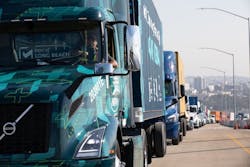Electric vehicles (EVs) for personal use are getting a lot of press, but electrification is coming to the domestic heavy-duty truck market, too.
Some of North America’s largest, most well-established truck manufacturers - including PACCAR, Volvo Trucks North America and Daimler Trucks North America - are rolling out new electric rigs, while companies like Tesla, Nikola and BYD continue to take electric truck orders.
What impact will electric trucks have on commercial truck tire design and construction?
As with electric cars, SUVs and CUVs, dynamics like range, torque and weight are concerns, say truck tire manufacturers.
Bob Klimm, director of commercial tire sales, Sumitomo Rubber North America Inc., says “the expectation of the replacement tire to support electric heavy-duty vehicles by maximizing driving distance is assumed to include some combination of rolling resistance, while maintaining mileage life and traction.
“Achieving this balance would be a challenging process for any manufacturer as we move into the future of tires.”
Tires also will need “to withstand higher torque based on the sudden acceleration capabilities” of electric trucks, says Rob Williams, vice president of U.S. TBR sales, Hankook Tire America Corp.
“In electric vehicles, you get the maximum torque when accelerating right from the very start,” says Tom Fanning, head of U.S. market for truck tires, Continental Tire the Americas LLC. “Tires on electric vehicles can therefore be subject to greater levels of stress during acceleration, which in turn affects their endurance and wear values.
“In order to keep the wear impact relatively low, it calls for modifications to both the tread pattern design and the tread compound. Very low rolling resistance is achieved by a blend of tread compound, tread pattern and the construction of the tire – and the sidewall in particular – as well as by keeping the overall weight to a minimum.
“All of these measures need to be carefully coordinated in order to ensure that these tires retain their very safe handling properties.”
Charles Luther, northeast regional manager, Triangle Tire USA, says “the demands of the tires on (electric trucks) will quite possibly differ from standard or even Smartway-approved tires. There will be increased emphasis on roll time and therefore increased emphasis put on reducing tire rolling resistance.
“Tires for any vehicle represent 13% of the rolling resistance of a vehicle,” notes Luther. “To increase the miles driven on a full battery charge, every aspect of drag needs to be looked at very carefully, including the tires. Tread depth, tread compounding and casing design all play a part in reducing rolling resistance.
“We quite possibly will see changes in all three, as well as aspect ratios and tire sizing, for these new electric commercial vehicles,” as tire manufacturers work to help electric trucks maximize their range.
Weight support will be another key performance attribute, according to Ken Coltrane, director, marketing and product development, Prinx Chengshan Tire North America. “With truck tires, the additional weight associated with electric commercial trucks is going to translate into higher load capacity and ply ratings - moving away from 14-ply to 16-ply.”
“What we are seeing is heavier equipment than standard diesel powered buses due to the increased weight of the batteries versus the diesel engine,” says Alan Eagleson, TBR segment manager, Sailun Tires America. “This means a commercial vehicle tire must be capable of carrying a heavier load,” which, he notes, “shouldn’t be an issue since tires are typically over-engineered for their applications.”
Wear is another concern, says Rick Cunat, managing director of Kumho Tire USA Inc.’s Americas technical center. “The desire to maintain consistent tire performance from new tire to worn-out tire” may require tread patterns “that increase in amplitude or aggressiveness as the tire wears.
“Electrification is a trend that will impact many different segments of the market,” says Ben Johnson, director of marketing, Bridgestone Americas Tire Operations, U.S. and Canada.
“The initial focus for tires used on regional and line-haul applications will likely focus on low rolling resistance to contribute to vehicle range,” notes Pierluigi Cumo, director of marketing, on-road, Michelin North America Inc.
Electric truck development will “push (tire) technology development ahead of schedule to meet the unique demands of this emerging market,” says Dave Johnston Sr., manager, commercial products and business development, Toyo Tire U.S.A. Corp.
“The performance characteristics of tires for electric vehicles are not that different from tires on fuel-powered vehicles,” says Rick Phillips, CEO of Keter Tire USA Inc. “The focus is on fuel efficiency and is moving more towards products that are application-specific and away from ‘one tire fits all.’”
About the Author
Mike Manges
Editor
Mike Manges is Modern Tire Dealer’s editor. A 28-year tire industry veteran, he is a three-time International Automotive Media Association Award winner, holds a Gold Award from the Association of Automotive Publication Editors and was named a finalist for the prestigious Jesse H. Neal Award, the Pulitzer Prize of business-to-business media, in 2024. He also was named Endeavor Business Media's Editor of the Year in 2024. Mike has traveled the world in pursuit of stories that will help independent tire dealers move their businesses forward. Before rejoining MTD in 2019, he held corporate communications positions at two Fortune 500 companies and served as MTD’s senior editor from 2000 to 2010.

